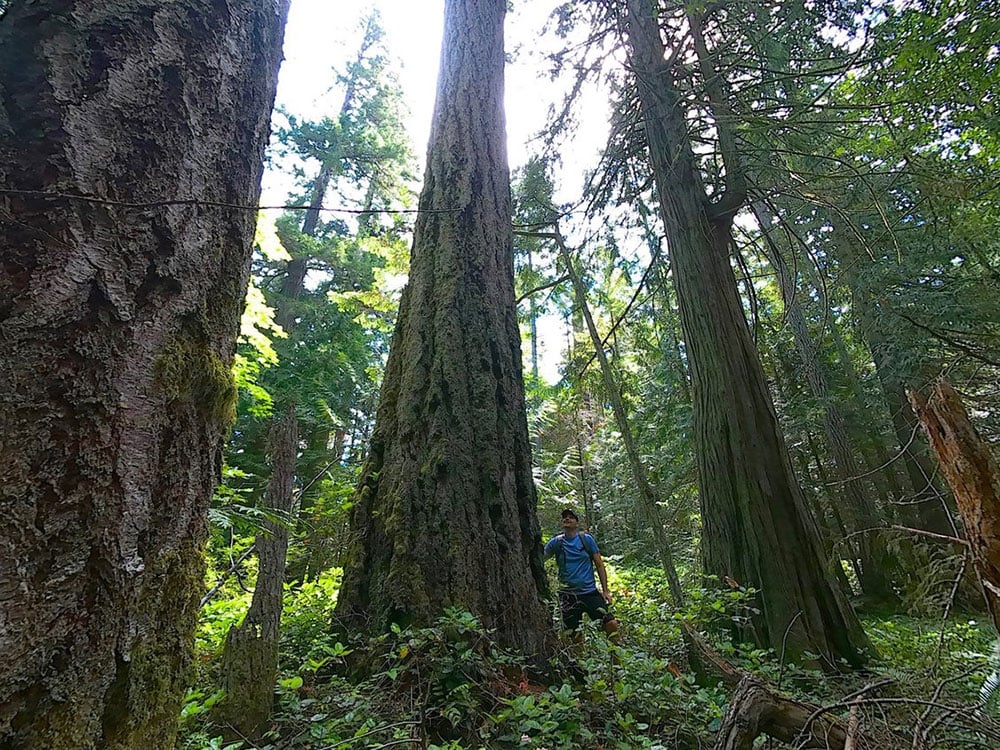When Ezra Morse set out to fight a residential development proposed for his community, he never imagined it would turn into a fight for free speech.
But a B.C. Supreme Court decision dismissing a defamation case against the Qualicum Beach resident and other project opponents is being hailed as a precedent-setting legal win for environmental groups and individuals speaking out against development.
“I was there to raise awareness and to hold our decision-makers accountable,” said Morse, a 13-year resident of the Vancouver Island community that’s home to about 9,000 people. “I think that it’s important, even if you don’t think you can change the world, that you still raise your voice and set an example for your family and your community that it’s OK and important to speak out.”
The decision, which was released Monday, cites legislation passed three years ago to protect freedom of speech and public participation.
The Protection of Public Participation Act allows the courts to dismiss civil claims known as SLAPP suits — or strategic lawsuits against public participation. Often, they’re filed by large, well-funded organizations against engaged citizens and activists.
In this case, Richard Todsen, Linda Todsen, and Todsen Design & Construction Ltd. sued Morse and the Qualicum Nature Preservation Society, alleging their statements during the campaign against the proposed development had defamed them.
Justice Jan Brongers found the lawsuit was prohibited under the anti-SLAPP act.
But in the year the defamation case has been before the court, the housing development proposal has continued through the approval process.
On Wednesday it was given the green light as Qualicum Beach town council voted to adopt bylaw changes that would allow the project to proceed, despite some councillors’ concerns about the ruling’s legal implications and the defamation suit’s impact on public participation. A motion to defer the decision was defeated in a 3-2 vote.
However, lawyers for Morse and the nature preservation society, a group he founded in 2020, say the B.C. Supreme Court decision remains a victory, as it marks the first time the anti-SLAPP legislation has been used to dismiss a defamation lawsuit targeting those speaking out about environmental issues.
“It’s the first time, to our knowledge, that the law has been used to defend lawful democratic expression of a conservation organization, or conservationists, sued in the context of a land-use dispute,” said Chris Tollefson, the lawyer representing Morse.
“This decision was an important test for our legislation. It signals that the legislation can and does protect people who find themselves the targets of this kind of lawsuit. This decision, and future decisions like it, will help make our democratic process healthier and more robust.”
In making his decision, Brongers found that 24 statements made by Morse and members of the preservation society on social media were either not defamatory or constituted fair comment.
Most also passed the test of public interest — meaning that the protection of free expression outweighed the right to sue for defamation.
“Public discussion about how approving a rezoning application could entail the weakening of existing environmental protection would seem to be the type of expression that the act was designed to foster and protect,” Brongers said in the decision.
The claim was originally filed on May 14, 2021 by the Todsens, the couple who own Todsen Design & Construction Ltd., a private construction and development business described in the decision as “a small, family run company” in Qualicum Beach.
According to the decision, the couple bought a 16.4-acre parcel of land adjacent to a 200-acre greenbelt in Qualicum Beach, which they divided with a business partner, each party using five acres to build their homes.
The Todsens then applied to Qualicum Beach town council in June 2019 to rezone the remaining 6.4-acre parcel to allow the development of 15 properties, which include 14 single-family homes, 10 garden suites and two duplexes. The development also requires an amendment to Qualicum Beach’s official community plan. Both were adopted at Wednesday's council meeting.
Morse founded the nature preservation society in April 2020 to address local conservation issues. Its fundamental purpose was “to advocate on conservation and environmental issues that impact Qualicum Beach and its residents,” the court decision states.
“They concerned Mr. Morse because he felt that building houses on the land in question would adversely affect Qualicum Beach’s environment,” Brongers wrote, adding that Morse “was also worried about the precedential impact that Town approval of the application may have on future development.”
Morse began a campaign to raise awareness and encourage political opposition to the project, which included posting on social media, the decision says.
The 24 statements the Todsens took issue with include comments about donations to the mayor’s campaign, which they said were framed as bribery, statements claiming the majority of the community opposes the project and statements related to the land’s protected status.
They also claimed that use of the word “assault” by Morse to characterize an Aug. 19, 2020 altercation between him and Richard Todsen at a public hearing was defamatory.
While Brongers found that the assault comments were defamatory, he added that they were “substantially true,” based on videos of the incident.
“In my view, the evidence before me shows that Mr. Todsen likely did ‘assault’ Mr. Morse, as that word is used in ordinary parlance, by subjecting Mr. Morse to a ‘violent physical or verbal attack,’” he said.
In an email to The Tyee, Linda Todsen said the couple was not at liberty to comment on the decision, as the matter is still with their lawyers.
Jason Gratl, counsel for Qualicum Nature Preservation Society, called the decision “an unequivocal win for freedom of expression.”
Gratl said it’s impossible to know how much the Todsens’ lawsuit stifled debate over their proposed development.
“There was some evidence that members of QNPS were intimidated and abated their level of political engagement or ceased participation in debate all together as a result of the lawsuit,” he said.
Despite the court decision, Qualicum Beach council voted to move ahead with the controversial bylaw amendments, voting down a motion to postpone the decision until the town had more time to consider the implications of the B.C. Supreme Court decision.
Planning director Luke Sales, reading from a statement by the town’s lawyers, said it was unlikely that the court decision will affect the validity of the public hearing. “From the town's perspective, our process has been solid and there aren't any concerns from the perspective of the lawyer,” he told council.
But Coun. Teunis Westbroek called the process “tainted” and asked for time to read the entire judgment to see if the procedure had been compromised. “I was appalled that some of these tactics were applied and I think we need to take another look before we proceed,” he said.
Coun. Anne Skipsey, who made the motion to defer, also called for time, saying she had sought her own legal opinion.
“What I heard is that there's a basis for seeking a more fulsome legal opinion before taking any further action on this rezoning,” Skipsey said, saying the council was “in uncharted territory.”
“No other local government has been in this position where we're considering a public hearing that took place during what the judge stated is a claim that is ‘in the nature of a type of SLAPP proceeding,’” she said, adding that some members of the public had not felt comfortable engaging in the public hearing.
“We should not be choosing development over democracy,” she said.
When introducing the legislation in 2018, B.C.’s Ministry of Attorney General called it a safeguard from lawsuits that limit or prevent the expression of individuals’ or groups’ points of view on matters of public interest.
Asked to comment on the recent decision, a ministry spokesperson said that it would be inappropriate to comment on an individual case.
Ministry staff periodically review decisions involving the Protection of Public Participation Act to identify any potential problems with the legislation that could require future amendments, the spokesperson said in a statement.
Despite the rezoning’s approval, Morse says he’s focused on the big picture about how the decision could protect British Columbians fighting for green spaces across the province.
While the society he founded will continue, Morse said he’s taking a step back from public discourse.
But he hopes the precedent-setting decision will encourage others to get involved.
“When everyone's talking, then you can’t target a single person,” he said. “I think it'll be years before I'm going to recover financially and emotionally from what we've been subjected to.”
While the court stopped short of awarding damages to Morse, saying it did not find the Todsens brought their claim “in bad faith or for an otherwise improper purpose,” the couple may still be responsible for legal costs.
Gratl said that on Monday he filed another application under the Protection of Public Participation Act to dismiss a legal claim by Deep Water Recovery Ltd., a Union Bay-based shipbreaking company 50 kilometres north of Qualicum Beach. He said the company is attempting to use the courts to discourage an opponent from gathering and disseminating drone footage of the operation. He said the information in the footage is “inextricably interwoven” with the public commentary.
“I think the growing body of case authorities should make corporate entities and project proponents think very carefully before attempting to suppress free expressions on matters of public interest,” Gratl said. ![]()
Read more: Rights + Justice, BC Politics

















Tyee Commenting Guidelines
Comments that violate guidelines risk being deleted, and violations may result in a temporary or permanent user ban. Maintain the spirit of good conversation to stay in the discussion.
*Please note The Tyee is not a forum for spreading misinformation about COVID-19, denying its existence or minimizing its risk to public health.
Do:
Do not: